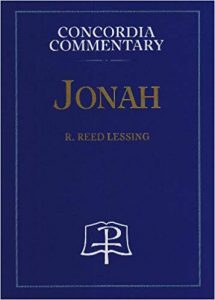Reed Lessing is the author of the Jonah volume in the Concordia Commentary series. He is the Senior Pastor at St. Michael Lutheran Church in Fort Wayne, Indiana. Previously, he was the Professor of Exegetical Theology and director of the graduate school at Concordia Seminary in St. Louis, Missouri. He studied at St. John’s College, Winfield, Kansas (B.A.), and Concordia Seminary (M. Div., S.T.M., Ph.D.).
Dr. Lessing is married to Lisa and their marriage has been blessed with three wonderful children. He enjoys jogging, biking, camping and following the St. Louis Cardinals.
7 Questions on Jonah in the Concordia Commentary Series
 Recently, Dr. Lessing graciously answered my questions about his Jonah commentary. Readers will learn how this commentary came to be, what is unique about it among Jonah commentaries, and how the project edified him personally.
Recently, Dr. Lessing graciously answered my questions about his Jonah commentary. Readers will learn how this commentary came to be, what is unique about it among Jonah commentaries, and how the project edified him personally.
1. What previous research and/or personal interests led you to this project and helped prepare you to write this commentary on Jonah?
My published dissertation, Isaiah’s Tyre Oracle: Interpreting Discontinuity (Eisenbrauns, 2004) launched my studies into Israel’s prophetic corpus. When I was on the faculty of Concordia Seminary, St. Louis, I frequently taught the book of Jonah. Eugene Peterson’s book, Under the Unpredictable Plant: An Exploration in Vocational Holiness (Eerdmans, 1994) added to my interest in Jonah.
2. Who is the intended audience for this commentary? Would it benefit pastors? professors? students? lay Christians in the local church?
The commentary targets pastors/theologians with a working knowledge of Hebrew. That said, the detailed textual notes are also intended to assist first-time Hebrew students as well as those who want to recover what they have lost of the language.
3. What is unique about this commentary? What contribution does it make to studies of Jonah?
The commentary interacts with themes in the New Testament and takes the position that Jonah is an accurate historical account. Seven excurses discuss broader themes such as Mission in the Old Testament and When Yahweh Relents.
4. What section or passage of this commentary was particularly memorable to research and write? Why?
Jonah’s psalm in chapter two echoes and/or quotes from twenty-five verses in the Psalter. The prodigal prophet is at his best when he is faced with Sheol.
5. What personally edified you in writing this commentary, increasing your affections for Christ?
Jonah is the only prophet Jesus compares himself with. The primary connection is that both fell under God’s judgment and both survived to talk about it. Jonah ends with a question—should Yahweh show compassion to the Ninevites and their animals? (Jonah 4:11) We don’t know how Jonah responded, yet we know what Jesus said when faced with similar questions regarding compassion. Jesus said, “yes,” and he wrote this answer in his own blood.
6. Besides your commentary, what are your top recommended books (commentaries or otherwise) on Jonah?
Fretheim, Terence. The Message of Jonah: A Theological Commentary. Minneapolis: Augsburg, 1977.
Magonet, J. Form and Meaning: Studies in the Literary Techniques of the Book of Jonah. Sheffield: Almond Press, 1983.
Sasson, Jack M. Jonah. New York: Doubleday, 1990.
7. What is next for you? What project are you currently working on? How can people follow your work and ministry?
I’ve finished a commentary on Zechariah and plan to begin editing it late this year.
You can follow my work at: https://books.cph.org/concordia-commentary
Own Reed Lessing’s Jonah commentary
The link provided will direct you to this volume via it’s exact ISBN number:
- Get Dr. Lessing’s commentary on Jonah at Amazon
- Get Dr. Lessing’s commentary on Jonah on Christian Book Distributors
Recent Posts
David Jeremiah, a renowned pastor, author, and speaker, has captivated the hearts of many with his compelling sermons. His messages resonate deeply with diverse audiences, leaving an enduring...
Tim Keller, a distinguished pastor, theologian, and author, has garnered a devoted following through the profound impact of his sermons. In this article, we will explore seven compelling reasons...
